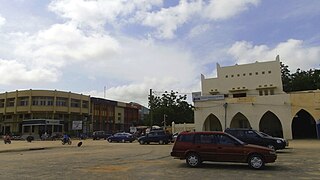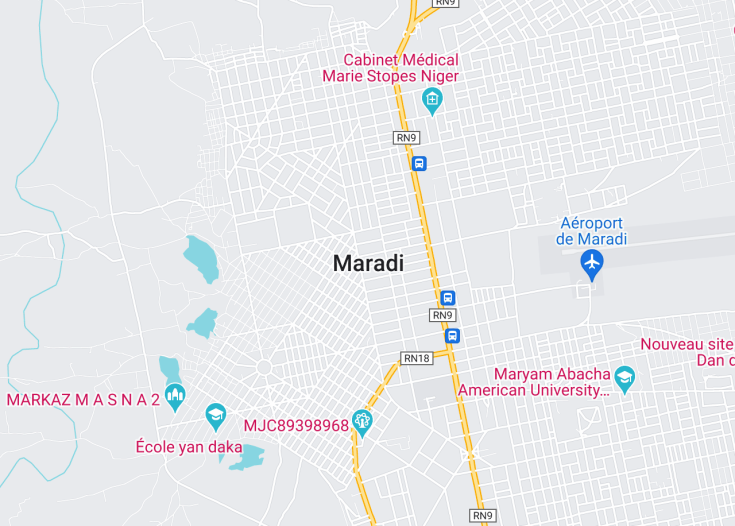Maradi, the third largest city in Niger, stands as a pivotal hub of commerce, culture, and tradition in the heart of the country. Particularly noted for its vital agriculture, Maradi is also a key trade link between Niger and Nigeria, fostering a vibrant cross-border synergy. Visitors can explore rich historical sites, vibrant markets, and engage with the warm, inviting local communities. The city not only offers insights into the traditional Sahelian lifestyles but also serves as a testament to resilient economic growth and cultural preservation in rural Africa.
When visiting Maradi, be sure to explore the bustling central market, a perfect place to experience local culture and purchase traditional crafts and spices.
Plan your visit during the cooler months from November to February to avoid the extreme heat, ensuring a more comfortable travel experience.
Top things to do & see in Maradi
Select the following sights and activities to discover best tickets and tours available in Maradi.
Maradi: The Heartbeat of Southern Niger
| Country | Niger |
| Time in Maradi | GMT+1 |
| Language spoken | Hausa |
| Population | 267,249 (source: World Population Review) |
| Currency | West African CFA franc (XOF ₣) |
| Airports |
|
Maradi, the third largest city in Niger, is a pivotal hub in the Sahel region, especially noted for its significant role in agriculture and trade. Historically, it has been a key player in trans-Saharan trade, acting as a gateway between various African countries. Maradi is also a center of learning and culture, reflecting a rich tradition that blends modern influences with deep-rooted tribal heritage.
Where is Maradi?
Maradi is situated in the southern part of Niger, close to the Nigerian border, making it a strategic location for cross-border trade and cultural exchange.
Distances:
| Route | Distance by car | Time by car |
|---|---|---|
| Niamey to Maradi | 600 km | 9 hours |
| Zinder to Maradi | 240 km | 4 hours |
What is Maradi famous for?
Maradi is famous for being an agro-economic powerhouse, driving Niger’s economy with its robust markets in grains and livestock. It serves as a crucial cultural and commercial link between Niger and its neighboring countries.
History
Pre-Colonial Era (Before 1900)
Maradi, now an administrative and economic hub in Niger, traces its origins back to a modest rural settlement. The area, which was primarily inhabited by Hausa peoples, slowly evolved with the development of trade routes linking the various empires in West Africa. The strategic location of Maradi facilitated its growth as a trading outpost, especially in salt, livestock, and grains.
Colonial Period (1900-1960)
The turn of the 20th century marked a significant shift for Maradi with the advent of French colonial rule. In 1901, French forces established a military post in Maradi, cementing its importance as a center of administrative and economic activities. During this period, the city saw the introduction of colonial architecture and the construction of rail lines, further integrating it into the regional economy and enhancing its roles in trade and governance.
Post-Independence Era (1960-Present)
Following Niger’s independence in 1960, Maradi emerged as one of the country’s vital economic centers. Rapid urbanization and development characterized this era, with investments in infrastructure like schools, hospitals, and roads. Today, Maradi is the third largest city in Niger, renowned for its vibrant markets and as a center for agro-industries. The city’s history of trade continues to influence its dynamic culture and economic activities, shaping it into a bustling hub that bridges its historic past with modern development.
Visit Maradi
What to see and do in Maradi
Maradi, a city rich in culture and history, offers a variety of attractions for visitors. The central market, known for its vibrant atmosphere, is perfect for those looking to experience local life and purchase traditional goods. The Grand Mosque, an architectural gem, reflects the Islamic heritage of the region. For history enthusiasts, the Maradi Regional Museum provides insights into the traditional arts, crafts, and customs of the Hausa people.
Annual Festivals and Events
Maradi hosts several cultural and religious festivities which reflect the traditional practices of the region. Notable events include the Cure Salée Festival, typically held after the rainy season, where nomadic tribes gather for a celebration that includes camel races, traditional music, and dance. Another key event is the Gani Festival, a celebration of the history and culture of the Hausa people, which takes place in December.
Best time to visit Maradi
The ideal time to visit Maradi is between November and February, during the cooler months of the dry season. This period offers comfortable temperatures and minimal rainfall, allowing visitors to fully enjoy outdoor activities and local events without the intense heat typical of other months.
is Maradi worth visiting?
Maradi is a city that offers a distinctive blend of traditional charm and modern development, making it an intriguing destination for those interested in West African culture and history. However, its appeal might be limited for those seeking high-end tourist facilities or extensive natural landscapes, as the city is primarily centered around its markets and cultural heritage. Potential visitors should also be prepared for the high temperatures and basic accommodations. Overall, Marari can provide a meaningful and culturally rich experience, particularly for those looking to immerouse themselves in the local way of life.










